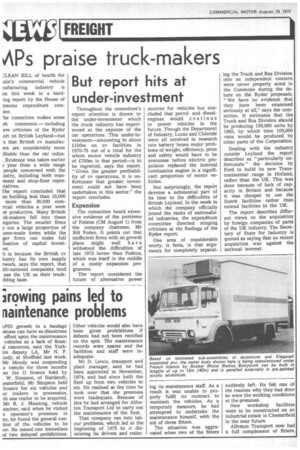APs praise truck-makers
Page 26

If you've noticed an error in this article please click here to report it so we can fix it.
But report hits at under-investment
LEAN BILL of health for :ain's commercial vehicle aufacturing industry is en this week in a harding report by the House of nmons expenditure corntee.
lhe committee makes some sh comments — including ere criticism of the Ryder ort on British Leyland—but 's that British cv manufacers are considerably more ,fitable than the car indus. Evidence was taken earlier 3 year from a wide range people concerned with the ustry, including both manment and shop-floor repreitatives.
Ile report concluded that ns less than 10,000 more than 30,000 cornrcial vehicles a year were .st productive. Many British ck-makers fell into these .egories. The smaller firms y out a large proportion of ume-made items while the ger firms can make full lisation of capital invest ft is because the British cv lustry has its own supply twork, says the report, that ilti-national companies tend use the UK as their truckilding base. Throughout the committee's report attention is drawn to the under-investment which the truck industry has experienced at the expense of the car operations. This under-investment—amounting to about £100m on cv facilities in 1970-75 out of a total for the whole motor vehicle industry of £70m in that period—is to be regretted, says the report. "Given the greater profitability of cv operations, it is unfortunate that greater investment could not have been undertaken in this sector," the report concludes.
Expansion
The committee heard extensive evidence of the problems of Fodens (CM August 1) from the company chairman, Mr Bill Foden. It points out that inefficient firms with no growth plans might well have withstood the difficulties of late 1973 better than Fodens, which was itself in the middle of a costly expansion programme.
The report considered the future of alternative power sources for vehicles but concluded that petroland dieselengines would continue to power vehicles in the future. Though the Department of Industry, Lucas and Chloride were all involved in research into battery buses major problems of weight, efficiency, price and safety would have to be overcome before electric propulsion replaced the internal combustion engine in a significant proportion of motor vehicles.
Not surprisingly, the repOrt devotes a substantial part of its time to the difficulties of British Leyland. In the week in which the company officially joined the ranks of nationalised industries, the expenditure committee directed stinging criticism at the findings of the Ryder report.
One area of considerable worry, it feels, is that arguments for completely separat ing the Truck and Bus Division into an independent concern were never properly aired in the Commons during the debate on the Ryder proposals. "We have no evidence that they have been examined seriously at all," says the committee. It estimates that the Truck and Bus Division should be producing 150,000 units by 1985, by which time 100,000 vans would be produced by other parts of the Corporation.
Dealing with the industry outside Leyland the report describes as "particularly unfortunate " the decision by Ford to build its new Transcontinental range in Holland, rather than the UK. This was done because of lack of capacity in Britain and because it was cheaper to use the Dutch facilities rather than extend facilities in the UK.
The report describes different views on the acquisition by foreign companies of parts of the UK industry. The Secretary of State for Industry is quoted as saying that no recent acquisition was against the national interest.




































































































